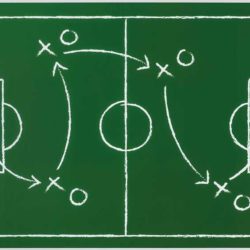The two most influential teachers in my financial literacy journey were also my piano teachers.
My first financial literacy teacher was my first piano teacher and also my mom. Many people probably learned about money from their parents. My mom didn’t talk about money management or investing directly, but I learned by watching. My parents separated right after I was born, so my mom raised two kids on a single income in New York City – that feat requires some high-level financial gymnastics!
My other financial literacy/ piano teacher was my teacher in college. I did a joint program with a liberal arts college and a music conservatory. My college piano teacher was a professional musician but he was also an avid investor, and realizing I was a double major with economics in addition to music, he peppered my lessons with musings about the stock market, economy and investing overall.
In celebration of April being financial literacy month, here are 5 key lessons I learned from my most influential financial literacy teachers:
1 – Save with a purpose

My mom was a prodigious saver, and she managed to cover not just the necessities, but some amazing experiences, like a 10-day family trip to several countries in Europe when I was in junior high school and years of music lessons for me, including conservatory training at Juilliard (this is not cheap!).
I never felt like clipping coupons or shopping around for discounts was stifling because I could see a big payoff. It’s a discipline I still use today – being frugal in general, but spending on things that really matter to me (which also happen to be travel and educational activities for the kids!).
2 – Consistency is key
My college piano teacher also was a good saver and drilled into me the importance of consistent retirement contributions starting as early as you can. He was nearing retirement age by the time I studied with him, and he had amassed a multiple 7-figure portfolio by then, starting with small amounts that compounded over time.
Thanks to his early advice, I started maximizing my retirement accounts with my first full-time paycheck. (There is a famous power-of-compounding example that compares saving at age 25 v. age 35 and how the older saver never catches up.)
3 – Side hustles are important
My mom had side hustles before that was a regular thing. She had her full-time accounting job, some part-time bookkeeping from time-to-time, and she was an Avon lady for years. I still remember helping her pack up the orders – it was surprisingly cathartic to apportion all the cosmetics into the little white bags.
I’m sure these side hustles helped cover our ongoing expenses, but it also made her less dependent on any single job. Over the years, she’s been at companies who have merged and then restructured (i.e., laid off staff) or companies who moved out of commuting distance or roles that no longer fit for whatever reason.
I never got the sense that she felt forced to stay anywhere she didn’t want to be, and that’s a life lesson, for sure, but also an important financial lesson. Just like you diversify investments, you want to diversify income sources – the wealthy always do.
4 – Making money and making art are not mutually exclusive

My college piano teacher toggled effortlessly between teaching me about whatever music thing we were working on and whatever financial topic came up for the day.
Both the music and the money were key priorities for him, and he never bought into the starving artist myth. It gave me a great real-life example to follow that you didn’t need to choose between making money and making art. Sure, there have been times I have earned less in the short-term to take on a more flexible job that enabled me to ramp up some creative pursuits, but over the long-term I have still been able to hit my financial goals.
5 – Help is all around you, so take it
My college piano teacher gave me various suggestions of financial publications to read and investment areas to look at. He was a big proponent of using diverse sources for news and regularly reminded me that helpful information was out there if you bothered to pay attention. Similarly, my mom was a master at maximizing the resources all around her – tapping into scholarship programs at my first music school and discount travel options.
I still read a lot and have uncovered tremendous help because of it. Sometimes it’s a big, flashy example, like finding a contest in one of my small business newsletters that resulted in a $10,000 prize for my new business and a national publicity campaign. More often, it’s a fun, money-saving treat, like a free limited-time exhibit or a discount available because of my alma mater or trade affiliation. (Pro tip: If you work for a large company, they often have all sorts of perks available to their employees, like discounts to cultural sites or even discounts on products and services – read your employee benefits manual!).
Happy Financial Literacy Month!
What were your most valuable financial lessons learned? Who were your most influential financial literacy teachers?


 We are Scott and Caroline, 50-somethings who spent the first 20+ years of our adult lives in New York City, working traditional careers and raising 2 kids. We left full-time work in our mid-40’s for location-independent, part-time consulting projects and real estate investing, in order to create a more flexible and travel-centric lifestyle.
We are Scott and Caroline, 50-somethings who spent the first 20+ years of our adult lives in New York City, working traditional careers and raising 2 kids. We left full-time work in our mid-40’s for location-independent, part-time consulting projects and real estate investing, in order to create a more flexible and travel-centric lifestyle.  Financial independence and early retirement is not something we originally focused on, but over time realized it was possible. Our free report,
Financial independence and early retirement is not something we originally focused on, but over time realized it was possible. Our free report, 








You were indeed blessed by a great parent and a capable mentor. I was as well and it led me to financial independence and a slightly early retirement. It is so much easier to win with money when people we respect share their wisdom with us in our younger years. Which you are paying forward by doing the same for your readers.
I hope that readers glean some wisdom! I definitely benefitted a lot from reading, even before personal finance tips were seemingly everywhere. Glad you had a strong financial literacy background from family ties too — it is so much easier when people are model what to do, instead of not to do!
My only question is where is that delicious coffee shop in the picture 🙂
Such time tested advice. Saving with a purpose gives us motivation, and consistency provides continuous, compounding growth. More people need to take advantage of employer perks and discounts for sure.